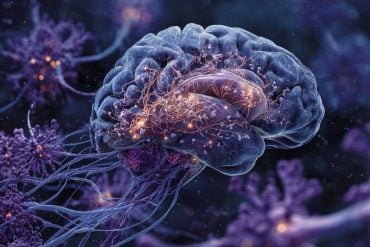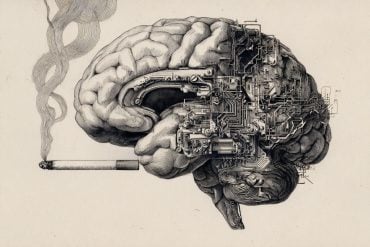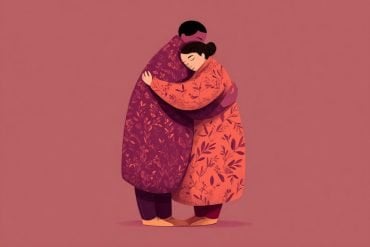Summary: Researchers have identified brain circuits that appear to put the breaks on binge eating and the cravings for fatty foods.
Source: UTMB Galveston.
Have you ever wondered why we crave the very foods that we try to avoid when dieting? Or wish there was a way to turn off the craving?.
Researchers from The University of Texas Medical Branch at Galveston have identified new brain circuits that may act as a brake on binge eating and junk food craving.
In rats who had spent a month eating a low-fat diet, researchers successfully inhibited the fatty food seeking behaviors. The findings are currently available in Behavioural Brain Research.
“Craving for foods high in fat – this includes many junk foods – is an important part of obesity and binge eating,” said Jonathan Hommel, assistant professor in the department of pharmacology and toxicology.
“When trying to lose weight people often strive to avoid fatty foods, which ironically increases motivation and craving for these foods and can lead to overeating. Even worse, the longer someone abstains from fatty foods, the greater the cravings.”

Several behavioral studies have demonstrated that denying certain foods, like being on a diet, causes increased craving and motivation for that food. However, the brain mechanisms that lead to this type of overeating are not known. To this end, the UTMB researchers sought to learn how the brain drives this potentially harmful behavior.
Using rats that had been placed on a 30-day low-fat diet, the UTMB team trained them to work for fatty treats by pressing a lever. To measure craving and motivation, the researchers kept increasing how many times the rats needed to press the lever in order to receive the treat until the rat gave up trying.
Next, half of the rats underwent a surgical procedure that blocked the effects of a brain chemical called neuromedin U receptor 2 within a region of the brain that regulates food intake. The other half of the rats did not receive this treatment.
After surgical recovery, the researchers found that the rats who had been treated did not work nearly as hard for fatty treats as their unaltered counterparts did.
“While our findings are only the first step in a long process from the scientific lab to the doctor’s office, we are planning to develop new drugs to help curb those cravings,” said Hommel. “Although it may be years before the drug is ready, our research highlights some important features of food craving that may help you set realistic New Year’s resolutions.”
Source: Donna Ramirez – UTMB Galveston
Publisher: Organized by NeuroscienceNews.com.
Image Source: NeuroscienceNews.com image is in the public domain.
Original Research: Abstract for “Incubation of feeding behavior is regulated by neuromedin U receptor 2 in the paraventricular nucleus of the hypothalamus” by David L. McCue, James M. Kasper, Ara 13, and Jonathan D. Hommel in Behavioral Brain Research. Published January 22 2019.
doi:10.1016/j.bbr.2018.08.015
[cbtabs][cbtab title=”MLA”]UTMB Galveston”Why We Crave Fatty Foods When Dieting.” NeuroscienceNews. NeuroscienceNews, 224 January 2019.
<https://neurosciencenews.com/craving-dieting-food-10631/>.[/cbtab][cbtab title=”APA”]UTMB Galveston(2019, January 224). Why We Crave Fatty Foods When Dieting. NeuroscienceNews. Retrieved January 224, 2019 from https://neurosciencenews.com/craving-dieting-food-10631/[/cbtab][cbtab title=”Chicago”]UTMB Galveston”Why We Crave Fatty Foods When Dieting.” https://neurosciencenews.com/craving-dieting-food-10631/ (accessed January 224, 2019).[/cbtab][/cbtabs]
Abstract
Incubation of feeding behavior is regulated by neuromedin U receptor 2 in the paraventricular nucleus of the hypothalamusc
A diet of energy-dense food, characterized mainly as a high-fat diet, leads to a persistent excessive consumption defined as overeating. According to the National Institute of Health, more than 2 in 3 adults in the United States are overweight or obese, straining our healthcare system with epidemic proportions. Diets that include abstaining from high-fat foods, ironically, result in an increase in motivation and craving for said high-fat foods, defined as an incubation effect because the behavior aids in developing overeating. Previously, we have shown that modulation of neuromedin U receptor 2 (NMUR2) in the paraventricular nucleus of the hypothalamus (PVN) results in increased food intake and motivation for energy-dense foods. Here, we continue our focus on NMUR2 in the PVN, but in relation to the incubation effect on craving for high-fat food. We employed a model for incubation of craving by having rats abstain from high-fat foods for 30 days before undergoing intake of fatty food on fixed ratio and progressive ratio schedules of reinforcement, and then assess their response to reactivity to cues. Using this model, we compared the feeding behaviors of rats that underwent an mRNA knockdown of the NMUR2 in the PVN to controls after both underwent a 30-day abstinence from high-fat foods. Our results show knockdown of NMUR2 in the PVN blocks the incubation of feeding behavior for food-related cues and high-fat foods.






